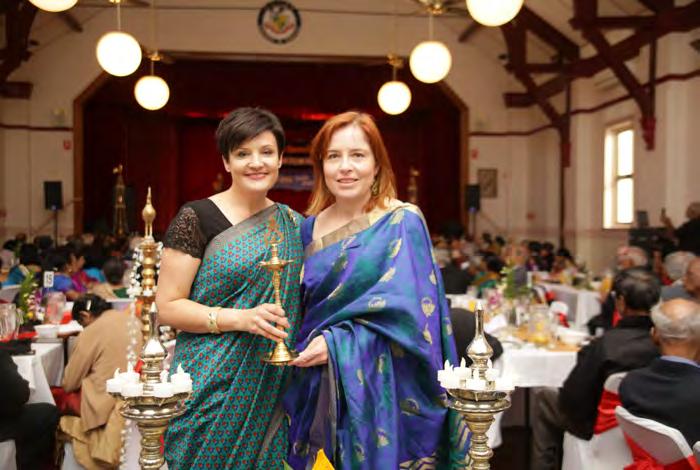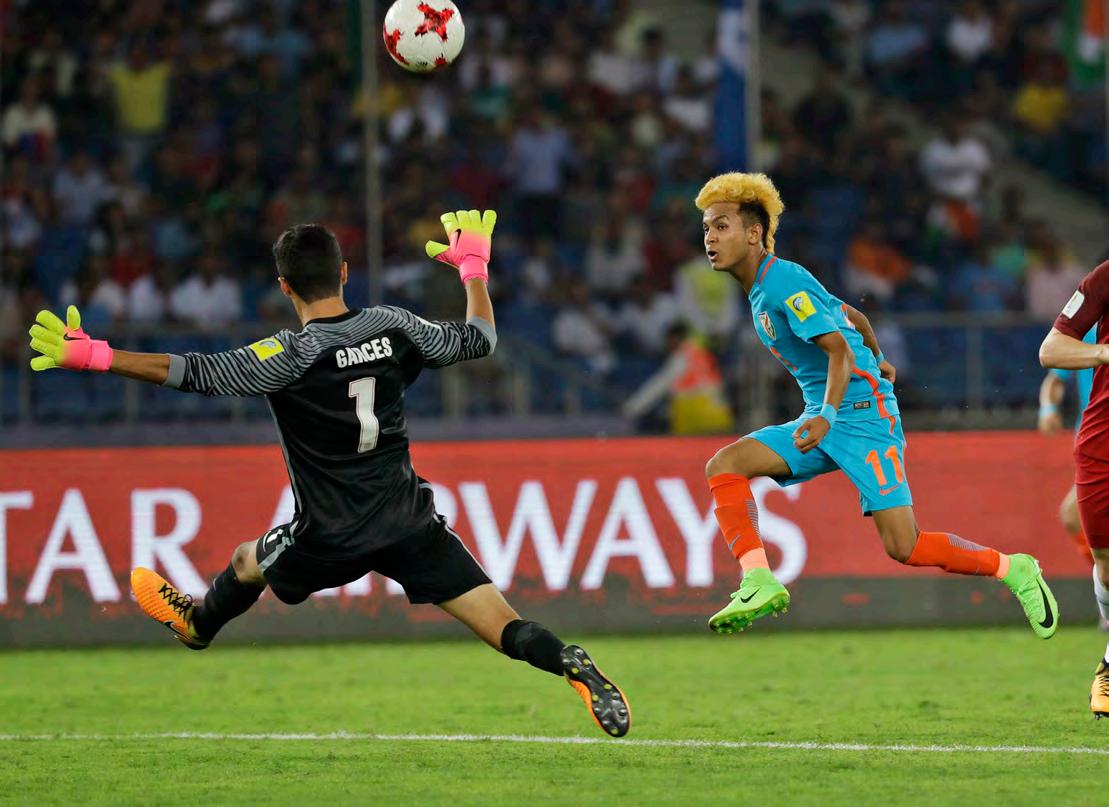
11 minute read
The Strathfield versus Granville Diwali Competition
from 2017-10 Sydney (1)
by Indian Link
Jodi McKay, Member for Strathfield and Julia Finn, Member for Granville invite you to show us how you celebrate Diwali. Participants must live in the state electorates of Strathfield (including Homebush and Burwood) or Granville (including Merrylands, Westmead and Wentworthville).

A winner will be selected from each electorate, and the overall winner (between the two) will win dinner with Jodi and Julia in Parliament. There is also a “highly commended” award for anyone who makes an entry but does not reside in either electorate.
Burwood (Next to Westpac) Suite 5, 168A Burwood road Burwood NSW 2134
Email: top_percent@live.com / www.top-percentcoaching.com PH: (02) 9747 3062 / MOB 0431 937 728
Entries close on the 20th of October 2017 and should be emailed to either Strathfield@parliament.nsw.gov.au or Granville@parliament.nsw.gov.au. Queries can be directed to 9747-1711 or 9637-1656.
Sex with wife below 18 is rape, rules Supreme Court
The Supreme Court of India said sex with wife below 18 years of age is rape, striking down the provision of criminal law that permitted sex with a wife aged between 15 and 18.
Referring to the Exception 2 to Section 375 of the Indian Penal Code that allowed such a sexual contact which now stands struck down, the court in its verdict said, “ ... in our opinion, sexual intercourse with a girl below 18 years of age is rape regardless of whether she is married or not.”
The husband is liable to be prosecuted if the woman files a complaint within a year of the sexual act, the Supreme Court said as it struck down the exception.
Describing the exception as “arbitrary, discriminatory and capricious”, the bench of Justice Madan B Lokur and Justice Deepak Gupta in their separate but concurring judgments said that its verdict would have a prospective affect.
Section 375, which defines rape, in Exception 2 said, “Sexual intercourse or sexual acts by a man with his own wife, the wife not being under fifteen years of age, is not rape.”
The court verdict came while deciding the question whether sexual intercourse between a man and his wife being a girl between 15 and 18 years of age is rape, after NGO Independent Thought had moved the court in 2013 against it.
The court, however, made it clear that it was not saying anything on the larger issue of marital rape.
“We make it clear that we have not at all dealt with the larger issue of marital rape of adult women since that issue was not raised before us by the petitioner or the intervener,” said Justice Lokur.
Describing the distinction between a girl child and a married girl child as “unnecessary and artificial”, he said it “has no rational nexus with any unclear objective sought to be achieved.” Holding this distinction was also “contrary to the philosophy behind some statutes, the bodily integrity of the girl child and her reproductive choice,” he said, adding that it also “turns a blind eye to trafficking of the girl child and surely each one of us must discourage trafficking which is such a horrible social evil.”
Justice Gupta in his separate but concurring judgment said that Exception 2 was “arbitrary, capricious, whimsical and violative of the rights of the girl child and not fair, just and reasonable” and thus was “violative of Article 14, 15 and 21 of the Constitution”.
Exception 2 grants “immunity” to the husband for the offence of rape especially when the “victim wife” is below the age of 18 years - at an age when she is “legally not capable of giving consent to have sexual intercourse”, he maintained.
Dismissing the Centre’s stand that it would not be proper to criminalize the consummation of child marriages which were taking place in a large number across the country, Justice Gupta said, “Merely because something is going on for a long time is no ground to legitimise and legalise an activity which is per se illegal and a criminal offence.”
He asked if a child marriage, which is admittedly “an evil” and also a criminal offence, can be “set up as an exception in a case of a girl child, who is subjected to sexual intercourse by her so called husband.”
“Shockingly, even if this sexual intercourse is forcible and without the consent of the girl child, then also the husband is not liable for any offence,” he said, pointing out several rights that a girl child loses including right to study and develop “physically, mentally and economically into a mature woman.”
No firecracker sale in DelhiNCR this Diwali: SC
The Supreme Court of India ruled that there will be no sale of firecrackers in Delhi and National Capital Region during Diwali, as it restored a November 2016 order banning the sale and stocking of firecrackers there.
The bench of Justice AK Sikri, Justice Abhay Manohar Sapre and Justice Ashok Bhushan, while restoring last November’s order, said, “We are of the view that the order suspending the licences should be given one chance to test itself in order to find out as to whether there would be positive effect of this suspension, particularly during Diwali period.”
However, the court said that the September 12 order lifting the ban on the sale and stocking of firecrackers in Delhi NCR will be back into effect from November 1.

Pointing to the adverse impact of the bursting of the fire crackers that is witnessed year after year, Justice Sikri said, “The air quality deteriorates abysmally and alarmingly and the city chokes thereby, it leads to closing the schools and the authorities are compelled to take various measures on emergent basis, when faced with ‘health emergency’ situation.”
This very situation, the court said, had occurred on the very next morning after Diwali in the year 2016.
“This order prevailed during the year but the impact and effect of this order remains to be tested on Diwali days,” the judgment said.
The court said, “We are of the opinion that the judgment dated September 12, 2017 passed by this Court should be made effective only from November 01, 2017.”
Making it clear that though it was not tweaking with the various directions issued by September 12 judgment, the court said that the effect of September 12 order “would not be given effect during this Diwali, and, therefore, we are making it effective only from November 1.”
It said that all the temporary licences that police had issued in pursuance to September 12 order stand suspended forthwith “so that there is no further sale of the crackers in Delhi and NCR.”
Further orders in this behalf can be passed on assessing the situation that would emerge after this Diwali season, it added.
Referring to the arguments by firecracker sellers that the contribution of firecrackers to the worsening of the air quality was negligible and there were other contributing factors, the court said, “On the contrary, we have the direct evidence of deterioration of air quality at alarming levels, which happens every year.”
“... , burning of these fire crackers during Diwali in 2016 had shot up PM (particulate matter) levels by three times, making Delhi the worst city in the world, so far as air pollution is concerned. Direct and immediate cause thereof was burning of crackers during Diwali,” it said.
India gives more medical visas to Pakistanis
Continuing a trend that started after a promise made on Independence Day this year, India has issued medical visa for a one-year-old Pakistani seeking open heart surgery and a man seeking a liver transplant.
“We have approved the visa request for liver transplant surgery of your uncle Mr Azhar Hussain in India,” External Affairs Minister Sushma Swaraj tweeted in response to a request from a Pakistani national Abbas.
Swaraj had earlier announced medical visa for a one-year-old Pakistani girl. ”We are giving visa for the open heart surgery of your one-year-old daughter Shireen Shiraz in India,” she tweeted in response to a request from the child’s mother Hira Shiraz.
So far this month, India has issued five medical visas for Pakistanis seeking urgent treatment.
India had last month also issued a medical visa to a Pakistani child seeking open heart surgery in India.
On Independence Day, the External Affairs Ministry had announced that India would provide medical visas to all bona fide Pakistani patients.
As ties between the two countries soured over various issues, the ministry had announced in May that only a letter of recommendation by then Pakistan Foreign Affairs Advisor Sartaj Aziz would enable a Pakistani national to get a medical visa for India.
The action was termed “highly regrettable” by Islamabad, which said that asking for a letter from the Foreign Affairs Advisor violated diplomatic norms and such a requirement had not been prescribed for any other country.
However, on July 18, a patient from Pakistan-administered Kashmir, seeking treatment in New Delhi for liver tumour, got a visa.
Swaraj then said that he needed no recommendation from the Pakistani government for a medical visa because the territory “is an integral part of India”.
Australian cricket team bus attacked in India
Australia’s cricket squad suffered a scare after a stone was thrown at their bus on its return to a hotel from the Barsapara Cricket Stadium in Guwahati.
The incident took place after Australia defeated India by eight wickets in the second Twenty20 International (T20I).
“Pretty scary having a rock thrown through the team bus window on the way back to the hotel!!” Australian batsman Aaron Finch wrote on Twitter, posting a picture of the broken window of the bus. No one was, however, injured. Australia also witnessed a similar incident during their tour of Bangladesh last month.
The Barsapara Stadium hosted its first international match 10 October.

Mumbai stampede: Officials get clean chit, rain to blame
An official probe into the September 29 stampede in Mumbai gave a clean chit to Western Railway (WR) officials, but instead blamed heavy rain and rumours for the tragedy that killed 23 railway commuters.
WR Chief Safety Officer (CSO), who conducted the inquiry into the stampede at a foot overbridge connecting Parel and Elphinstone Road stations, submitted the report to General Manager Anil Kumar.
It includes statements of injured commuters, eyewitnesses like police and railway officials and members of the general public. The inquiry also analysed closed-circuit television footage at the station and the foot overbridge.
The probe report said a vendor dropped a bunch of flowers and a cry of ‘Majha phool padla’ (my flower fell) led to the spread of rumours of ‘pool padla’ (bridge fell), which “possibly triggered panic and led to the stampede”.
“The committee concluded that the tragedy occurred due to a downpour and accumulation of commuters on the overbridge and the staircase around 10 a.m. on the fateful day,” the CSO observed in his report.
WR Chief Spokesperson Ravinder
Bhakar told media later during the day that “rumour, coupled with sudden torrential rain” on September 29 morning led to a huge rush at the Elphinstone Road station and the bridge, which led to the tragedy.
“Many people stranded on the bridge were unable to move due to heavy rain, even as other commuters were stepping out of trains and trying to climb the bridge,” Bhakar said.
The probe committee also recommended certain short- and longterm measures for Mumbai suburban stations, including installation of additional CCTVs at stations and in trains, removal of all encroachments on bridges and foot overbridges and in railway stations’ vicinity, among others.
Trump asks Congress to enact merit-based immigration, silent on H1-B visas
While keeping mum on H1-B visas, US President Donald Trump has asked Congress to introduce a merit-based immigration system that could benefit Indians but would also deny green cards to some relatives of immigrants.
Trump’s 70-point enforcement plan calling for stiff immigration reforms unveiled by the White house would continue to allow the spouses and children of immigrants to get green cards or permanent resident status but not their brothers, sisters and parents.
The goal of the merit-based system that awards green cards based on factors like education, employability and English language proficiency is “to promote assimilation and financial success”, the White House said.
A merit-based system is likely to benefit India if the national quotas limiting green cards to about 20,000 per country per year are also done away with and they are awarded purely on merit.
Because of the large number of highly qualified Indians, most of the professionals from the country face an 11-year wait to get green cards and a meritbased system could cut down the delay. Professionals from all countries except India and three others do not have to wait for their green cards.
Trump’s wide-ranging reform package proposes the stiffest immigration reforms ever offered by an administration and seeks to make good on his election promise of getting tough on immigration.
But it faces strong opposition in the Congress from Democrats and some Republicans making it unlikely to pass in the near future.
The request to Congress for legislation formalises the immigration reform plan he announced in August.
The proposals sent will deal only with permanent immigration and with illegal immigration, and not with the temporary H1-B visas given to professionals and advanced degree-holders from US universities.
India has expressed concern over the future of H1-B visas because Trump had said during his election campaign that he would limit them because he asserted they affected the employment prospects of Americans.
When External Affairs Minister Sushma Swaraj met US Secretary of State Rex Tillerson last month, she raised the H1-B visas.
So far the H1-B system has been functioning without any changes and the immigration service is processing applications at the same levels as before.
One of the items in the proposal that concerns Indians is the future of those brought in illegally by their parents as children and have grown up here.
It is estimated that there about 7,500 Indians in this category referred to as “Dreamers”.
Former President Barack Obama issued a presidential order allowing the “Dreamers” to remain in the US and to work.
Trump is rescinding the order and asking Congress to pass a law not to allow them to stay on.
Yet another issue that concerns India is that of illegal immigrants and criminals whom the US wants to deport, but New Delhi has refused to accept some of them because of what it says are inadequate proof of their identity and Indian citizenship.
Nisha Biswal to head USIndia Business Council
Nisha Biswal, a former US Assistant Secretary of State for South and Central Asian Affairs, will head the US India Business Council (USIBC), according to an official announcement.
“We are thrilled to welcome Nisha Biswal to the US-India Business Council and to the US Chamber team,” said Myron Brilliant, US Chamber executive vice-president and head of International Affairs.
“She is a driven, visionary leader who has a strong record of advancing United States business across the growth markets of Asia and throughout India.
“Under her strong leadership, we’re confident the US-India Business Council will play a critical role growing commercial partnership, investment, and innovation across the world’s oldest and largest democracies,” Brilliant said in a press release.
The 42-year-old former diplomat will start her tenure from October 23 next.
Biswal succeeds another Indian American, Mukesh Aghi, who left the organisation following disagreements with the US Chamber of Commerce. The USIBC, an advocacy group that promotes business and commercial ties between the US and India, has presence in both the countries.
“I am honoured and excited by the opportunity to lead the US-India Business Council and to join the leadership of the US Chamber of Commerce during a period of historic opportunity for both countries,” she said in the USIBC release. “As one of the most significant and fastest growing markets, India is an important economic partner for the US. Likewise, Indian companies are investing in ever greater numbers here in the US. I am proud to be part of an organization which will play such a critical role shaping USIndia relations, and I am thrilled at the chance to help our companies deliver a brighter, more prosperous future for the citizens of the US and India.”
Modi’s EAC to focus on India’s economic growth, employment
With the economy slowing down and joblessness becoming a major issue, the newly-constituted Economic Advisory Council to Prime Minister Narendra Modi identified 10 major priority areas including accelerating economic growth and employment over the next six months.
The 10 themes were identified during the first meeting of the council chaired by NITI Aayog Member Bibek Debroy. The council was reconstituted a fortnight ago in what was seen as the government acknowledging for the first time the problem of economic slowdown.
Apart from giving recommendations to the Prime Minister on these issues, the EAC-PM would also focus on the next budget preparation over the coming months, Debroy told reporters here after the meeting.
“The 10 themes identified are economic growth, employment and job creation, informal sector and integration, fiscal framework, monetary policy, public expenditure, institutions of economic governance, agriculture and animal husbandry, patterns of consumption and production, and the social sector,” Debroy said. IANS










